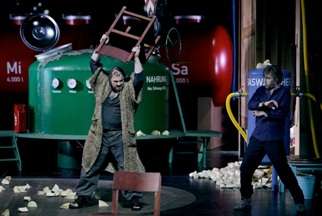|
Back
Art Becomes Deed, or Does It? Bayreuth
Bayreuther Festspiele
07/28/2012 - & August 3, 9*, 15, 21, and 27, 2012
Richard Wagner: Tannhäuser
Torsten Kerl (Tannhäuser), Camilla Nylund (Elisabeth), Michelle Breedt (Venus), Michael Nagy (Wolfram von Eschenbach), Günther Groissböck (Landgrave Hermann), Lothar Odinius (Walther von der Vogelweide), Thomas Jesatko (Biterolf), Arnold Bezuyen (Heinrich der Schreiber), Martin Snell (Reinmar von Zweter), Katja Stuber (a young shepherd)
Bayreuther Festspiele Orchestra and Chorus, Christian Thielemann (conductor)
Sebastian Baumgarten (director), Joep van Lieshout (set), Nina von Mechow (costumes)

T. Kerl & M. Nagy (© Enrico Nawrath)
Sebastian Baumgarten’s installation-heavy production of Wagner’s “Romantic Opera” was heavily booed when it premiered last summer. But like many Bayreuth productions that were poorly received upon introduction, this one has been cleaned up, refined, and rather better received in its second outing. The concept remains a bleak one. Tannhäuser is the legend of a man torn between two worlds: the realm of Venus, a place of sensual delight and pagan idolatry, and the realm of the Wartburg, a place of piety and virtue. In Baumgarten’s dystopian view, the Wartburg is a harsh and functional industrial setting, a factory where waste is recycled into sustenance and alcohol for the consumption of a fawning populace of drones clad in numbered t-shirts. Screens exhort them to obedience with pseudo-Brechtian slogans such as “Art Becomes Deed.” The entire presentation of the pilgrims who go on pilgrimage to Rome is presented as the repair of faulty parts. At the end of Act II a crowd of drunks loads into a shipping container marked “Rome” and returns in Act III as a reformed corps of disciplined workers. The Venusberg, on the other hand, remains an outpost of freedom for refugees from this strictly controlled world. In the prelude and bacchanale, we see primitive humans surrounding Venus and the wayward Tannhäuser in a cage smearing red paint on each other. It is a better effect than the prehistoric creatures who cavorted in the cage last year, though some of them are preserved more peripherally. And it continues the production’s logic, which suggests that the more evolved a society becomes, the less freedom it enjoys. Indeed, the prelude and bacchanale music and third act prelude are accompanied by video images of single-cell organisms multiplying over x-rays of human bones.
It is Venus’s role, however, that has evolved the most over last year. The goddess is pregnant with Tannhäuser’s child and is sent into labor when Wolfram declares Elisabeth to be Tannhäuser’s savior on high. During the second act, she is present in the Wartburg scene, not just as an idle presence, but as a real temptress who is known to seduce good citizens of the Wartburg into decadence and woe. It is becoming more fashionable to identify the character with the evening star, the astral body that we know as planet Venus, and here, too, Wolfram’s third act song is delivered as a serenade to the character. Another revision stands out in Elisabeth’s death. As she did last year, her prayer aria still culminates in suicide – with the character entering a bio-gas tank. This year, at least, she does not have second thoughts and try to escape before Wolfram pushes her back in.
The production is still garish and disturbing, but no one can say it is without thought or reflection. The musical effort is of a higher caliber than last year, too. Christian Thielemann led the orchestra with verve in a more original version of the score, with the second act ensembles performed in full this year. The music ranged from gripping sobriety to ecstatic joy in the hands of this superb conductor. At the final curtain he emerged with the entire orchestra to accept thunderous applause. Torsten Kerl took over the title role this time, delivering a solid performance that suggests the lighter Wagner parts are more for him than the Siegfrieds he has attempted with mixed success elsewhere. Camilla Nylund’s Elisabeth remains less convincing in voice, though the set piece greeting and prayer scenes stood as outstanding examples of musicianship. The development of Venus owes much to the intelligent dramatic abilities and full bodied sound of the South African mezzo Michelle Breedt. Michael Nagy’s Wolfram benefited from this excellent young baritone’s superb legato. Günther Groissböck sang Landgrave Hermann with authority. And no performance in Bayreuth should be reviewed without mention of its stunning chorus, which delivered its important part in this opera with unsurpassed skill.
Paul du Quenoy
|